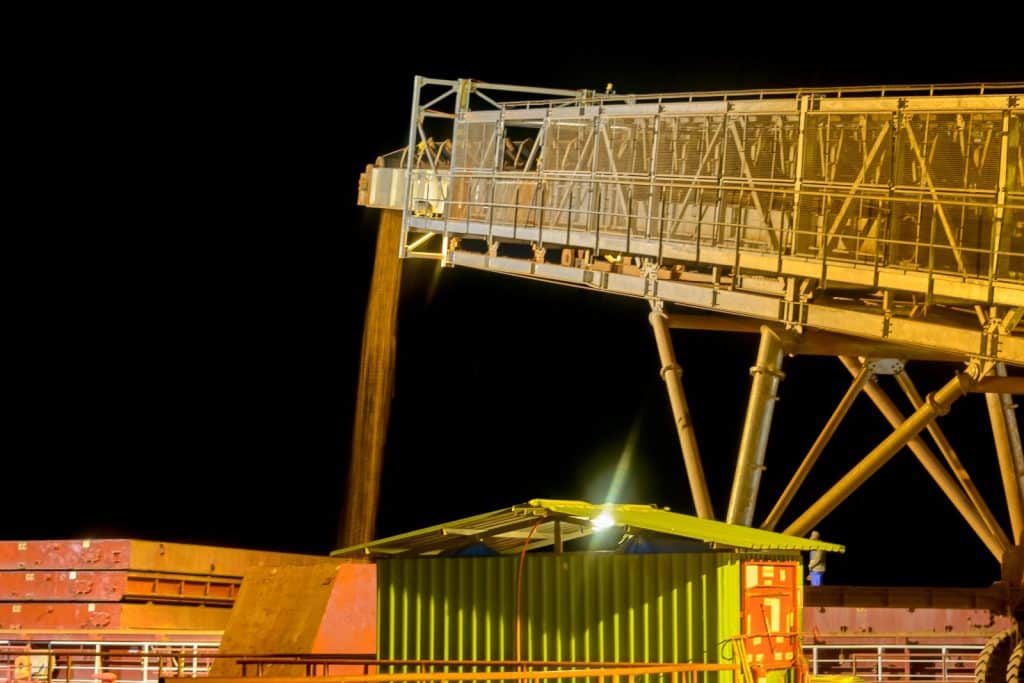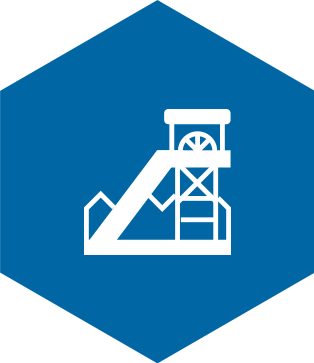OSHA and MSHA mandate the usage of conveyor guards to ensure safety in the workplace. However, they can sometimes unexpectedly slow down daily tasks.
West River Conveyors will fabricate custom guarding to ensure regulation compliance and minimize the impact on operations and maintenance.
We specialize in conveyor and material handling systems for mining and bulk material industries. Our expert engineers understand both the environment and the operational needs.
Contact us today to learn how we’ll help keep your employees safe and operations running at full speed.

There are various types of conveyors, such as underground, overland, stacker, belt, or screw. They all have drive systems that often include rollers. These elements create nip points that cause injuries to workers. Proper guards stop things like fingers, clothes, or limbs from getting caught. However, they must fit securely around the nip point and be durable enough to last in demanding environments.
MSHA literature talks about three guarding methods:
Point-of-contact guards enclose the potential nip point or points. Location guarding refers to placing moving parts where they cannot be accessed without special equipment. Typically, this means more than seven feet away from workers. Area guarding keeps workers away from an area with moving machinery or other mechanisms.
Conveyor belt safety guards play a critical role in maintaining smooth operations. Workers must sometimes remove them for maintenance, repairs, or clearing jams. The best guards are those that designers have made easy to remove without causing undue burden. Hinged access doors can sometimes be an efficient alternative to completely removing the guards.
Guarding also protects conveyor equipment from damaging debris that could cause an unplanned shutdown. Guards can guide the material down the conveyor to prevent spillage. They also reduce the wear and tear on conveyor components, prolonging their operational lifespan. Furthermore, guards can help maintain the overall cleanliness of the work area by containing dust and particulates.
This reduction in wear and tear can also lead to cost savings, as it minimizes the need for frequent repairs and replacements. Guards can help maintain the overall cleanliness of the work area by containing dust and particulates. By doing this, they enhance the workspace environment and contribute to improved worker health and productivity.
One of the biggest benefits is that well-designed guards prevent accidents. In addition to the human cost, accidents mean lost output. Thoughtfully designed conveyor guards from West River Conveyors ensure worker safety and minimize inconvenience during servicing and maintenance. This helps save both time and money.
Ensuring the guards aren’t too large or heavy in the design process is vital. Yet, they must also comply with OSHA and MSHA requirements for closure and securing methods. Good conveyor design should balance functionality, safety requirements, ease of use, and durability.
At West River Conveyors, we design conveyor guards that complement your operations while adhering to regulations. Our engineers take the time to measure your equipment and space. They then create a tailor-made solution based on the dimensions, specified access, and material removal needs.
Our design for conveyor guards prioritizes safety while preserving functionality and accessibility. We select mesh sheet metal because it offers strength and visibility. This choice allows for unobstructed airflow, which is essential for the optimal operation and temperature of the enclosed components. Additionally, this material enables rapid and straightforward inspection of components.
We sometimes use solid metal to guard certain parts, such as the shafts. The conveyor component we want to protect decides what we use to make the guard and how we design it. For example, each guard must be strong enough—yet not too heavy. This allows them to perform their job without getting in the way when workers perform maintenance or repairs.
We construct guards to shield critical conveyor components such as drive units, belts, chains, pulleys and sprockets, rollers, and takeup units. These elements are critical for the conveyor’s functionality and thus require robust protection. Our guards protect these parts and offer convenient access for maintenance and repairs. Achieving this balance is key in designing durable and effective conveyor guards.
We think carefully about every conveyor part when it comes time to design a guard system. Our engineers choose materials that ensure the guards work well and are easy to use. The end goal is to protect the mission-critical parts of your conveyor system and ensure a long lifespan.
Every conveyor guard we create at West River Conveyors is unique and tailored to your system’s needs. We can fabricate them in various materials and structures, from solid sheets or plates to wire mesh. While solid materials are highly effective, they can impede airflow and prevent component inspection.
That’s why we often prefer mesh sheet metal. It provides strength and flexibility while meeting opening size and minimum distance requirements. We may use wire or other types of mesh for area-guarding applications.
Regardless of your needs, our engineers will review your requirements and work with you to find the right solution. Your preferences and job specifications guide our process, ensuring your conveyor system receives top-notch protection.
Several factors come into play when selecting a conveyor belt guard for your conveyor system. The design and purpose of your conveyor system play a crucial role, as these specifics shape the protective function of the guard. Conveyor size and the materials it moves also influence the overall design and dictate the metal thickness.
Installation ease is another crucial factor. The guard you choose needs to integrate smoothly with your conveyor system. They should also allow you to remove them for maintenance and repairs easily. These factors contribute to efficient operations and the prolonged use of your conveyor system.
Regulatory compliance is the final consideration. Organizations like OSHA and MSHA set multiple safety standards for your conveyor system. These strict requirements vary depending on the industry, state, and the type of material you’re moving.
The industry experts at West River Conveyors have a keen understanding of how to keep machinery and workers safe. However, we also realize that conveyor guards should not impede daily operations. Our engineers will listen to your needs and work closely with you to design and fabricate the right guard system for your needs.
Protect your workers and machinery while ensuring compliance with a custom conveyor guard system from West River Conveyors.
A: We can often retrofit them onto existing conveyors. We will need detailed information regarding the dimensions, clearances, and other specifications to ensure a proper fit.
A: It’s no secret that OSHA and MSHA regulate guarding. However, that’s not to suggest that all regulations impede operations. Well-designed guards do not hinder operational efficiency. They do contribute to preventing accidents or things from getting onto the belt. Remember that unscheduled conveyor downtime due to preventable accidents or belt issues will cause many unwanted inefficiencies.
A: You must inspect them regularly for damage, cleaning, adjustments, and debris. You’ll also need to tighten the bolts to ensure proper fit.

Cost-effective solutions for hauling aggregates like sand and gravel over long distances.
LEARN MORE
Improve mining operations with custom conveyors that are tested for safety and reliability.
LEARN MORE
An online inventory stocked with gearboxes, fluid couplings and other parts ready to be shipped.
LEARN MORE
Avoid unplanned downtime and injuries that can arise from worn out conveyor belts.
LEARN MOREEfficient material handling is crucial for mining productivity, safety, and cost-effectiveness. Whether you’re upgrading an existing conveyor system or adding a new one, careful planning and execution are essential. This read more »
As mining operations grow, so does the need for efficient material handling solutions. Expanding production requires systems that can keep up with increased demand while maintaining reliability, safety, and cost-effectiveness. read more »
Imagine your mining operation grinding to a halt because of one overlooked component. It happens more often than you'd think, and the culprit is frequently the conveyor belt—the unsung hero read more »